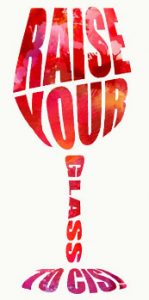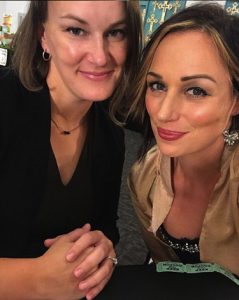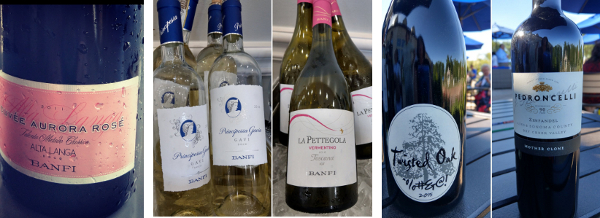Sounds rather provocative does it not: wine as a benefit for school-aged children at risk of dropping out of their studies? But for students in the Clear Creek Independent and Dickinson area schools, it is just that -- thanks to the fine folks at Communities in Schools - Bay Area.
 Each year Communities in Schools - Bay Area a 501(c)(3) non-profit hosts 'Raise Your Glass to CIS' a wine tasting event during the day-long Keep Kids in School Golf Tournament at Bay Oaks Country Club in the Clear Lake City area south of Houston. Ticket holders to the event taste five paired wines, while local sommeliers and wine educators provide notes on grape varieties, growing regions and other suggested pairings in a "speed tasting" format. Rather than guests lining up at a bar, volunteer somms rotate through tables of 10 guests each providing plenty of time to ask questions, share thoughts and socialize with table companions. We choose wines often from lesser known grapes and regions, and may be hard to pronounce. This way we not only expose wine lovers and enthusiasts to 'new' wines but help them more confidently order wine in a restaurant or wine bar. It is our way to make wine more accessible as well as share some wines we have come to know and love with supporters of one of our favorite charities.
Each year Communities in Schools - Bay Area a 501(c)(3) non-profit hosts 'Raise Your Glass to CIS' a wine tasting event during the day-long Keep Kids in School Golf Tournament at Bay Oaks Country Club in the Clear Lake City area south of Houston. Ticket holders to the event taste five paired wines, while local sommeliers and wine educators provide notes on grape varieties, growing regions and other suggested pairings in a "speed tasting" format. Rather than guests lining up at a bar, volunteer somms rotate through tables of 10 guests each providing plenty of time to ask questions, share thoughts and socialize with table companions. We choose wines often from lesser known grapes and regions, and may be hard to pronounce. This way we not only expose wine lovers and enthusiasts to 'new' wines but help them more confidently order wine in a restaurant or wine bar. It is our way to make wine more accessible as well as share some wines we have come to know and love with supporters of one of our favorite charities.
How does CIS help Keep Kids in School?
But how does this translate to help keep at-risk kids in school? Combined with the golf tournament, "Raise Your Glass to CIS" raises money for the local affiliate of a national evidenced-based model that focuses on four key components: (1) educational enhancement, (2) supportive guidance, (3) pre-employment training and (4) parental involvement. Through one-on-one or group tutoring CIS gives students incentives to excel academically. CIS case managers also work with students to help refer them and their families to agencies that can provide them with counseling and guidance. CIS staff and guest speakers offer pre-employment education and present career opportunities and CIS encourages parents through home visits, activities and parenting classes, to be an intricate part of their child's development. Founded by Bill Milliken in 1977, Communities In Schools is the nation’s leading community-based organization helping students achieve in school and prepare for life. Currently, the organization directly serves more than 1.26 million students and their families each year in more than 2,700 schools in 28 states and the District of Columbia.
What makes a student "At-Risk" for Dropping out?
At-risk students can come from a variety of backgrounds and situations -- some frightening, some heartbreaking and some caught up in local or national crises. The common thread among each of the at risk students is that they have lost hope -- hope that he or she will "make it" in school, in their lives, in the world. Some obstacle keeps the student from seeing a future and his or her place in it. It could be a small thing -- her family cannot afford healthcare or dentistry: imagine trying to focus on a lesson with a tooth ache. Some kids may come from parents who lack the time, skills or maturity to nurture them. Or it could be something more devastating. Some may be homeless: in our own community Hurricane Harvey made many homeless whose middle class families had previously no need for services. They had never asked for help, and now they felt embarrassed to do so. Maybe it is a child suffering PTSD, and in need of counseling after a school shooting like the one we had in Sante Fe, Texas last year. For other kids it could be something more recent: their parents may be worried about missing a paycheck or two from a government shutdown, which rubs off on the kids as well.
Communities in Schools believes every child needs and deserves five basic concepts:
A personal one on one relationship with a caring adult
A safe place to learn and grow
A healthy start and a healthy future
A marketable skill to use upon graduation
A chance to give back to peers and the community

Communities in Schools (CIS) founder Bill Milliken cites changes in society that create a fracturing of community. "We've all been put into silos," he says, and people have stopped connecting face to face within a community. One problem, he says, is that the current generation does not know the difference between an 'infomationship' and a relationship. "We are more connected, and less relational than any time in history." Technology is important because it allows us to maintain connections to relationships, he says, but you cannot have a relationship without breaking bread, across from each other, and connecting face-to-face (versus Facebook).
"We are all hungry for community and unnaturally separated from one another," says Milliken. "Kids don't see 'community' if they don't see us loving each other and working together," he says. "And love is the only transformational thing we have."
Does it Work?
In a word - yes! For Communities in Schools-Bay Area, 98 percent of CIS-BA potential drop-outs, in the nine Clear Creek ISD and six Dickinson ISD campuses they serve, stay in school. 97 percent of CIS seniors graduate on time and 91 percent are promoted to the next grade level. 75 percent of CIS-program students enroll in post-secondary education.
Every child needs a personal relationship with a caring adult to succeed and stay in school, says Milliken.
Hillary Gramm, CIS - Bay Area Development Director agrees, "I've dedicated my career to the non-profit sector working with children because I've seen how one child's entire trajectory can change because someone cares enough to love them."
Hillary Gramm helps CIS - Bay Area Achieve its Goals

Hillary is one of the main reasons I help Communities in Schools by working on the Raise Your Glass to CIS committee. A native of Chicago, Hillary earned a Bachelor of Science at Purdue University and a Master of Arts at University of Houston - Clear Lake. She is posh and professional yet artsy and fun. She changes her hair color as often as I do mine -- I've seen it blonde, brunette, red, and with a streak of blue! She loves cats, her family and works tirelessly for Communities in Schools. The first year I was actively on the committee Hillary was nine months pregnant and still coordinating when her daughter was born four days before the event.
Involved in Big Brothers, Big Sisters, she also runs marathons -- literally -- and raises money for the Houston SPCA. She helped grow the wine event from a 50 - 60 attendee "Ladies Who Lunch" auxiliary program while the husbands played golf, to a fun and festive wine tasting that continues to blossom. From its inception, the event nearly tripled in attendance (now at capacity with 160 maximum) with a waiting list -- after selling out in less than two weeks, last year. Hillary shows she appreciates the volunteers, and never forgets to say "Thank You" at every opportunity including giving each committee member a piece of art created by her talented sister Lisa Dalke.
Hillary is not a complainer, but a problem solver. When the 2016 event was cancelled due to flooding, she rescheduled it with aplomb. On the new date, it went off without a hitch. Later, she tells the story of how she almost "lost it" and then cut off all her hair. The silver lining is that she looks even more fabulous with a short 'do.
I mentioned working with Hillary is one reason I continue to help. The second is a bit more complicated: My parents were both public school educators. Although few people know it, they both came from "broken homes" and felt "called" to education, as it is what pulled them out of their own "at-risk" situations. As such they worked long hours teaching and helping other kids in similar situations. My mother would invariably get the larger percentage of at-risk kids in her elementary school classes. My father took special interest in the at-risk renegades and problem kids whose parents had given up on. Even after they were promoted from or left his junior high school, he would attend their high school basketball and football games. We were amazed at the number of former students who attended his funeral, sharing with us how much he had changed their lives.
But just as the proverbial shoemaker's children went barefoot, my parents devotion to others' children often caused them to neglect their own. My dad rarely, if ever, attended my high school performances in music, orchestra or marching band during our football and basketball games -- he was busy attending those of his other 'kids' -- those students he had mentored, rather than the ones he fathered.
In terms of being "at-risk" myself, there was never a chance of my dropping out of school -- evidenced by my three post-secondary college degrees -- school was where I felt most-comfortable and validated. That was where I got my self-worth. But often all my after school activities and studying were a plea for approval, attention and love. Like many of the "at-risk" kids today, what I lacked most was hope.
The Game changer is Hope
"Hope is not a soft word," say Milliken. "Hope is a game changer. If someone doesn't have hope they are going to do one of two things -- they're going to hurt you or they will hurt themselves."
In our current political and socioeconomic environment we place ourselves in silos and echo chambers and spend hours arguing on Facebook and social media with other 'tribes' -- because many of us have lost hope.
When asked what is the difference between the kids who make it and those who don't, Bill Milliken says, "they make it because we have allowed them to make it. The greatest gift you can give to someone, is to allow them to give something to you."
"We're all broken - and we all need each other," he says. "If we create these small environments where everyone is expected to give, then we are able to receive these gifts."
Communities in Schools - Bay area is one of these small environments where I can give -- and in turn receive gifts every year when one of the CIS - Bay Area student alumni shares how the program has changed his or her life. I am just one of 100 volunteers that comprise the two committees, but I use my gifts and connections in the wine world to help out.
In its first year (2010), the Keep Kids in School Golf Tournament raised a little over $100,000, which was actually huge for the area. Last year combined with the Golf Tournament we raised $227,156 amazingly exceeding our goal, even after Hurricane Harvey diverted resources from many of our previous donors, as well as state grants.
Raise Your Glass to CIS wines last year included 2011 Banfi Cuvee Aurora Rose’ Metodo Classico, 100% Pinot Noir from Alta Langa DOCG (Piemonte, Italy); Banfi 2016 Principessa Gavia Gavi, 100% Cortese from Piemonte, (Piedmont) Italy; Banfi La Pettegola Vermentino Toscana IGT, 100% Vementino from Toscana, (Tuscany) Italy; Twisted Oak Winery *%#&@! (Potty-mouth) a Cote du Rhône-style blend of Mourvedre, Syrah, and Grenache from Calaveras County, California; and 2015 Pedroncelli Zinfandel Sonoma County Dry Creek Valley Mother Clone, a hearty Zinfandel from Sonoma County, California. We so appreciate our sponsors from Banfi, Twisted Oak Winery and Pedroncelli, who donated or heavily discounted our chosen wines so that most of our proceeds would go directly to help keep kids in school.
Volunteer sommeliers and wine educators for Raise Your Glass to CIS 2018 included Joe Power (Another Wine Blog), Donna Chicosky, Sandra Crittenden (SandraCrittenden.com), Tony Farr, Jim Hull, Lynn West, Charles Chang (wine and beer enthusiast at Another Wine Blog), League City Chamber of Commerce CEO & President Steve Paterson (the Cork Guy), Adam Folden (Food and Beverage Manager at South Shore Harbour Resort) and Larry Brett (guest writer, Another Wine Blog and former Wine and Beverage Manager at Bay Oaks Country Club).
Past years' selections at Raise Your Glass to CIS include Freixenet Cordon Negro Brut Cava from Penedes, Spain; Gaia Estate “Thalassitis” Assyrtiko from the Greek Island of Santorini; Eroica Riesling from Chateau Ste. Michelle in Columbia Valley, Washington; Bodegas Caro ‘Aruma’ Malbec a joint venture between Domaines Barons de Rothschild (Lafite) and the Catena family in Argentina; and Tercero 2009 Syrah – Larner Vineyard, Ballard Canyon in the Santa Ynez Valley of Santa Barbara County, the only American Viticultural Area (AVA) dedicated to Syrah. Other wines served include Chateau-Rives Blanques – Blanquette de Limoux from Languedoc, South of France; 2014 Troon Vineyard Black Label Vermentino from Applegate Valley, Oregon; 2016 Martin Ray Winery and Vineyards Russian River Valley Rose’ of Pinot Noir; 2014 Troon Blue Label Estate Zinfandel, Applegate Valley, Oregon; Sartori di Verona Estate Collection 2013 Valpolicella Classico Superiore DOC; and Tinazzi Selezione di Famiglia Valpolicella Ripasso Superior DOP 2013 (Italy, Veneto).
Raise Your Glass to CIS 2019
The 10th Annual Keep Kids in School Golf Tournament and Raise Your Glass to CIS is set for April 15th 2019 again at Bay Oaks Country Club. The wine event begins with a 2:30 p.m. toast, and sommelier wine pouring begins promptly at 3:00 p.m. Tickets to the wine tasting event include paired wine tasting of five wines, an olive oil tasting, live and silent auctions and a "Fresh off the Grill" steak dinner at 5:30 p.m. Tickets for Raise Your Class to CIS, priced at $125 each (aged 21 and over please), go on sale in mid-February and will sell out quickly. Sponsorship is still available. For more information on tickets and sponsorship visit Communities in Schools - Bay Area Facebook page. To learn more about Communities in Schools-Bay Area work and programs visit their website at www.cisba.org
Learn more about how Communities in Schools changes lives around the country in this video:
Cheers!
The WineWonkette



